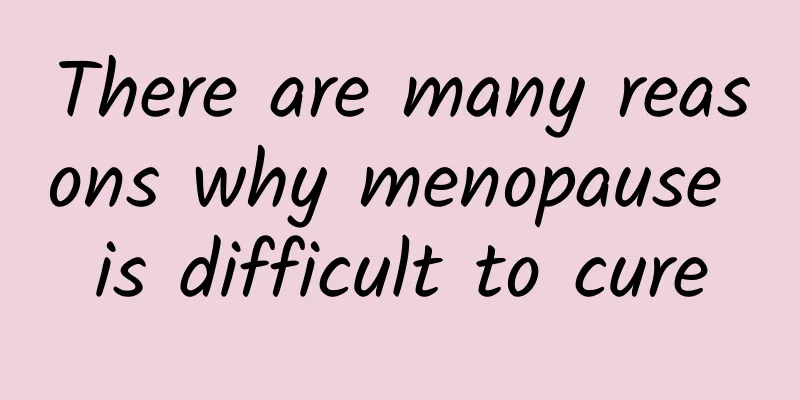There are many reasons why menopause is difficult to cure

|
Menopause is a necessary stage for every woman. It can be said to be a turning point in the life of female friends. After menopause, various signs of the body begin to age. However, female friends must not be pessimistic about this. This is the normal development of human beings and is inevitable. The early or late menopause time is caused by many factors. The following introduces the causes of menopause: 1. Genetic factors Impact on postmenopausal women The DNA sequence and its variation in the human body reflect the human evolution process. Studying DNA sequence variation (i.e. polymorphisms) in different populations and individuals helps to understand human physiological changes, the occurrence and development of diseases, and the response to drug treatment. 2. Ovarian aging (1) Follicle reduction and ovarian morphological aging. At birth, there are about 700,000 to 2 million follicles in the ovaries. There are still about 400,000 follicles during puberty. There may be very few follicles left at menopause. There are two ways to cause follicle reduction: ovulation and atresia. (2) Decline of ovarian function Reproductive function Women's fertility begins to decline between the ages of 30 and 35, and declines significantly when they are close to 40. From regular menstruation to menopause, there is usually a period of irregular menstruation. During this period, the follicles mature irregularly, ovulation may or may not occur, and the cycle may be normal, long, short, or completely unpredictable. Therefore, the length of the cycle and its changes can also be used to reflect ovarian function. When there is no follicle development and menopause, reproductive function ceases. 3. Atrophy of the reproductive tract Changes: The vulva loses most of its collagen, fat and ability to retain water, glands atrophy, secretion decreases, sebum secretion also decreases, and the skin becomes thinner, dry, and cracked. The vagina shortens, narrows, has fewer wrinkles, thins the wall, weakens elasticity, and secretions decrease. In the early stage, it shows congestive changes, the wall is fragile and easy to be injured and bleed, there are diffuse or scattered ecchymoses, and in the late stage, the color becomes pale and the adhesion bands increase. Through the above understanding of the causes of menopause, it is not difficult to see that there are some genetic factors that are difficult for us to change. Instead of worrying about it all day, it is better to accept it. Face life optimistically and correctly view menopause as an inevitable physiological process. If you feel uncomfortable before and after menopause, you can consult a doctor. |
>>: Can menopause be completely cured?
Recommend
Children with insulin resistance are becoming fatter, suffering from diabetes, and even developing acanthosis nigricans!
Diabetes is not exclusive to adults, be careful, ...
How to prevent premature ovarian failure
How to prevent premature ovarian failure? There a...
Effects of hyperprolactinemia in pregnant women on the fetus
There are many reasons for infertility. After the...
Jane with a nice butt lost 5 kg by eating vegan burgers in 5 weeks!
The Brazil World Cup is in full swing. American p...
How to determine uterine prolapse
Uterine prolapse refers to the reduction of the u...
Common knowledge about ectopic pregnancy
When a woman has an ectopic pregnancy, the harm t...
Patients with ovarian cysts need to understand their examination methods
Ovarian cysts are very harmful and can endanger t...
You can slim down your arms by staying at home! Female Chinese Medicine Practitioner's Secret Techniques
As autumn approaches and the temperature gets coo...
What are the harms of uterine fibroids to the human body?
What are the hazards of uterine fibroids to the h...
Are there serious side effects of oral contraceptives?
Oral contraceptives are a common contraceptive me...
The causes of functional uterine bleeding in adolescence.
Dysfunctional uterine bleeding may be anovulatory...
Keira Knightley uses mushrooms as a magic weapon to maintain her figure
Hollywood actress Keira Knightley became famous a...
How long does it take to rest after an abortion?
After an artificial abortion, you usually need to...
To lose weight and get rid of belly fat, high-fiber fruits and vegetables are the most effective! 10 fruits and vegetables that quickly break down fat
Modern people are busy with work and most of thei...
Get rid of the frog-like figure with a protruding belly! Learn how to do slimming finger exercises to effectively burn fat
She has slender limbs, but she does have a protru...









